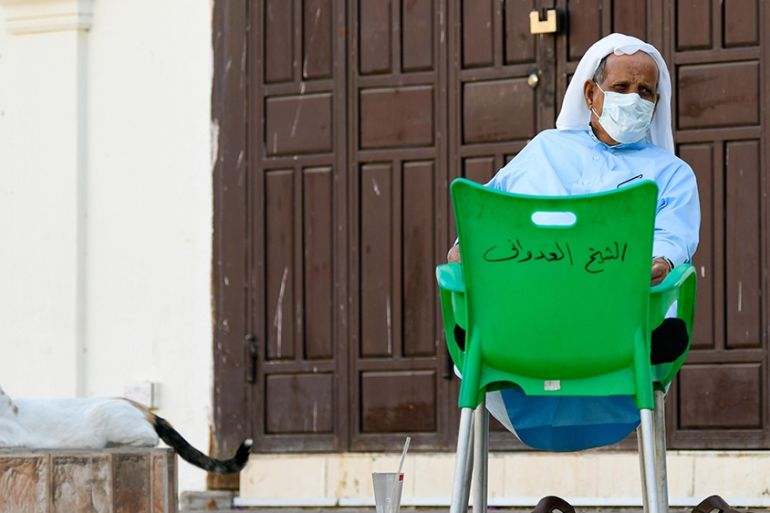Saudi king offers to pay for coronavirus patients’ treatment
Saudi Arabia’s health minister says citizens and residents diagnosed with the virus will be covered by the kingdom.

Saudi Arabia will finance treatment for anyone infected with the coronavirus in the country, the health minister said on Monday, while the agriculture ministry took steps to boost wheat and livestock supplies amid global fears of a food shortage.
The kingdom has registered eight deaths among 1,453 infections, the highest among the six Gulf Arab states.
Keep reading
list of 3 itemsYoung, gifted and Yemeni: Writers find inspiration despite war
Why Houthis offered Saudi POWs swap for jailed Palestinians
Health Minister Tawfiq Al Rabiah said King Salman would cover treatment for citizens and residents diagnosed with the virus, urging people with symptoms to get tested.
“We are all in the same boat,” he told a news conference, adding Crown Prince Mohammed bin Salman was overseeing containment efforts “night and day”.
|
|
The kingdom’s de facto ruler was last seen publicly at a cabinet meeting on March 3, days before detaining his uncle and three cousins in a move seen as cementing his eventual path to the throne.
Supply chains
King Salman, his 84-year-old father, addressed the nation two weeks ago and chaired an extraordinary virtual summit of G20 leaders to advance a global response to the coronavirus pandemic.
G20 trade ministers are holding an emergency video conference on Monday to discuss cooperation on supply chains.
At a separate news conference, the agriculture ministry spokesman said Saudi Arabia would start importing at least 1.2 million tonnes more wheat next month, adding to strategic reserves of about one million tonnes.
Abdullah Abalkhail said the kingdom also expanded the list of countries from which it can import livestock.
Saudi Arabia has taken drastic steps to contain the coronavirus, halting international flights, closing most public places, and imposing a partial curfew.
Restrictions on movement have tightened with entry and exit to Riyadh, Mecca, Medina and Jeddah heavily restricted.
MERS lessons
The world’s last major coronavirus outbreak, in 2012, began in Saudi Arabia, where a faltering response allowed the Middle East Respiratory Syndrome (MERS) to kill several hundred people and spread across the region.
This time around, the kingdom was better prepared, public health officials say. Their experience of MERS meant hospitals had already established separate triage units for respiratory illnesses, with specialised ventilation to protect medics from infection.
At least two hospitals also had drive-thru testing in place and seven weeks before the first domestic case, authorities developed guidelines to deal with the new virus.
|
|
“Their experience with MERS uniquely positioned them because they learned a lot from that,” said Joanna Gaines from the US Centers for Disease Control and Prevention, which for years has supplied the Saudi health ministry with its only full-time foreign disease expert.
“They know it’s MERS season and they’re already cued up for that. The preparation and processes … really cuts down on your exposure right away.”
Acting fast
Kuwait also took drastic measures early on to contain the new pandemic, halting air travel, imposing curfews, and quarantining and testing thousands of people.
Kuwait has recorded no fatalities among 266 cases. Initial outbreaks in both countries were linked to foreign travel.
The World Health Organization said Saudi Arabia’s “whole of government” approach had benefitted from the MERS experience and “unique expertise” in emergency preparedness from managing the Hajj pilgrimage, the world’s largest annual gathering of Muslims.
Kuwait also has experience with national health emergencies, from the oil well fires after the 1990 Iraqi invasion to fears of biological and chemical warfare during the 2003 US invasion of Iraq.
It took precautionary measures soon after reporting its first case on February 24, a week before Saudi Arabia.
“Continuous parliamentary pressure made government institutions feel they must perform,” said Nada Al-Mutawa, management professor at the Australian College of Kuwait.
Qatar death
Neighbouring Qatar recorded its first death from the new coronavirus on Saturday, while its infections rose by 28 to 590, the health ministry said.
The United Arab Emirates recorded two deaths on Monday in Arab and Asian nationals, both in their 40s with pre-existing heart conditions, raising the death toll to five among 611 infections. The country extended distance learning until the end of the academic year.
The health ministry in Bahrain, which has recorded four deaths and 500 cases, said a plane of evacuated citizens from Iran landed in Manama, without providing details.
Another plane landed in Kuwait carrying 70 of its nationals from Tehran, Kuwait said.
|
|